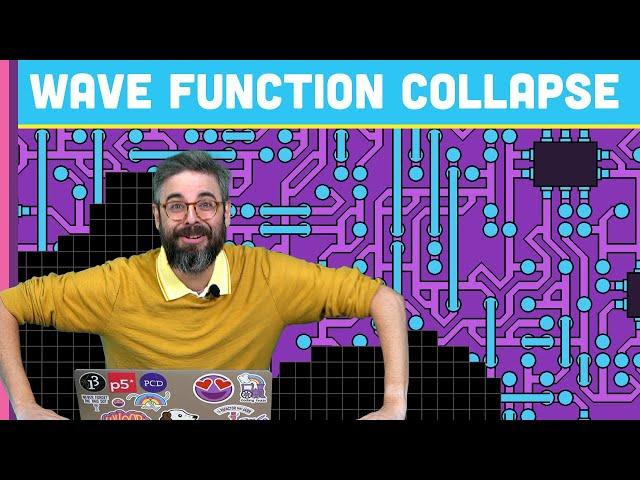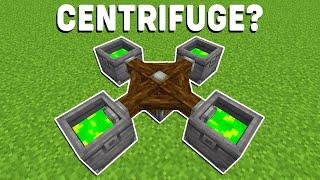
Coding Challenge 171: Wave Function Collapse
Комментарии:

It feels so bad to critique a vid of a channel with such a great vibe, but maaan this was hard to watch, I know it's suposed to be you going through your thought proccess, but the first half felt a bit too much like a waste. Also, maybe it's just worse on headphones, but the constant error beeps are annoying.
Ответить
Can you not bring out the mistakes? I admit that this is very exciting and exposes the process, but it will fucking mislead people. You know, it makes you confused!
Ответить
I just found your channel, I do agree with the comments, you are the bob ross of Computer science! So chill and non-perfectionist, playful way of coding and working with concepts!
Ответить
Watching this while playing a sudoku puzzle for maximum immersion
Ответить
my brain has collapsed
Ответить
This is exactly what I'm trying to do with Excel VBA – fitting 27 unique 1 × 14 patterns to fill a 64 × 14 grid under several constraints/criteria. Many thanks for the insights
Ответить
the recursive propagation is the not complex part of WFC, and it is not really needed when you do it on a GPU.
Ответить
I would think you could use linear programming to achieve the same thing. After all, it works on sudoku. Might be fun to think about.
Ответить
Loose typing is so scary
Ответить
Instead of splitting the side into sockets, have a nullable Constraint on each side. Each cell has an array of 4 nullable neighbors and another array of 4 nullable constraints. If the neighbor is null it is an edge (no wraparound). If the constraint is null, the cell is blank. The constraint object satisfies IEquatable interface.
Ответить
Could you do this with the Einstein tile?
Ответить
Just wanted to add my ❤! Great, fun video. Thank you for all your coding and video editing efforts!
Ответить
Very educational and entertaining. Those 78 minutes are totally worth it!
Ответить
Is this very much how ChatGPT works?
Ответить
He finally discovered dark theme?
Ответить
You're focusing on the array too much. Create a data structure to store the tile data and populate the array with those.
Ответить
I wonder, if this could be adapted to generate actual working PCB (autorouting) - that would be a wfc with constraints (hand -placed components, really dynamic rules for the connections [nets] for startes) (I guess this might be how autorouters of old might have worked...?)
Ответить
Best thing you did in this video was rename the const tiles to const tileImages. You were confusing yourself so much.
Ответить
As a professional software developer, I can attest that the montage with the ever-increasing error counter and holding your head in your hands is very true to life.
Ответить
Oh my gosh at one hour and twelve minutes still not doing wave function collapse. You need to update every tile touching any updated tile which means you might update a tile multiple times per placement and there may be many tiles you don't need to update.
If you are hitting tiles that have no solution that means you aren't doing wave function collapse.

it helps allot watching you ACTUALLY solve this, Then comparing that to how I do it, then I can see how I Think/feel in relation and if I am in the right path
Ответить
You've enumerated your sockets into 12 distinct points, but I think you could get away with only having 9 as each corner is notated by 2 indices and they always match.
Ответить
console.table() made my day.
Ответить
Such an awesome explanation! Can't wait for the overlapping algorithm
Ответить
I really want to see you doing the overlapping model 🥺
Ответить
This is kind of like videogame map generation.
Ответить
For a second thought that you are Warren Spector
Ответить
I enjoyed the editing, good job Mathieu Blanchette!
Ответить
This is why I read..
Ответить
Beautiful video using ugly language. Wish you were coding in python
Ответить
Brain function collapse
Ответить
The way you explain thigs with such enthusiasm is really nice. Amazing! Thanks a lot for the video
Ответить
love you man
Ответить
i stuck at evaluating entropy figuring how on earth "gridCopy" can directly mutates the "grid" the whole week 😭
turn out the splice function only shallow copied the "grid". the reference is still the same.
learnt something new everyday

too funny for a typescript developer for 3 years to thought that video~
Ответить
valid.include[element] !!!!
Ответить
Amount of time this man lost because Java Script syntax :D
Ответить
Slice only creates a shallow copy of the array. the objects stored in it won't be copies but just references to the same objects. this will be evident by doing the following
let x = {t: 23, x: {y:25, b: {a:1}}};
let x2 = {t: 23, x: {y:25, b: {a:1}}};
let y = [x];
let z = y.slice();
z[0] === x //true;
let xCopy = {...x};
x === xCopy; //false
x === x2; // false;

Thanks this actually helped me build my own wave function collapse system in unreal engine.
Ответить
“As the appearance of the bow that is in the cloud in the day of rain, so was the appearance of the brightness round about. This was the appearance of the likeness of the glory of the LORD. And when I saw it, I fell upon my face, and I heard a voice of one that spake.”
Ezekiel 1:28 KJV

You need some Typescript in your life
Ответить
OK, now use this to simulate a quantum computer.
Ответить
What about wave function collapse agreeance when you have multiple simultaneous entry points at great distances from each other.
Ответить
did you rotoscope that whole whiteboard session? wow
Ответить
zaiste zajebiste
Ответить








![Starship - We Built This City (Official Music Video) [HD] Starship - We Built This City (Official Music Video) [HD]](https://rtube.cc/img/upload/UVlTc0loQThiMUs.jpg)

![PRIMAL CODE - Opaque Fixation [FULL ALBUM STREAM] PRIMAL CODE - Opaque Fixation [FULL ALBUM STREAM]](https://rtube.cc/img/upload/MEY4Sk5VUzVTRmg.jpg)














